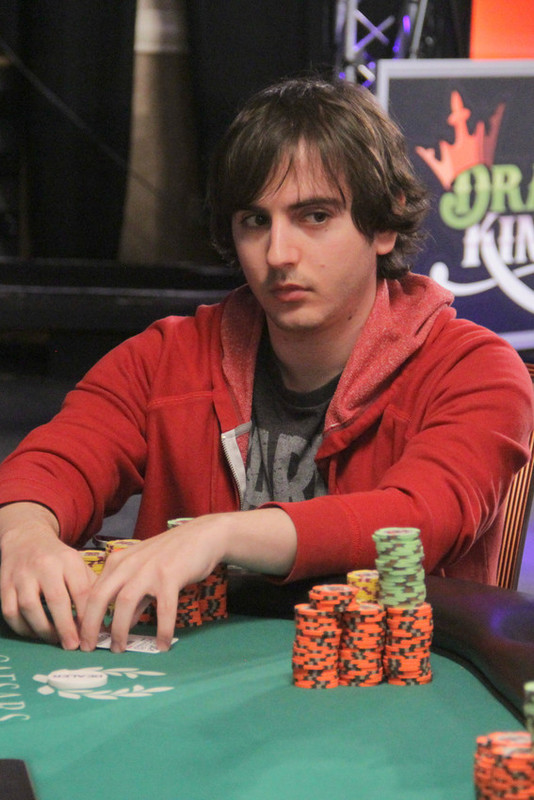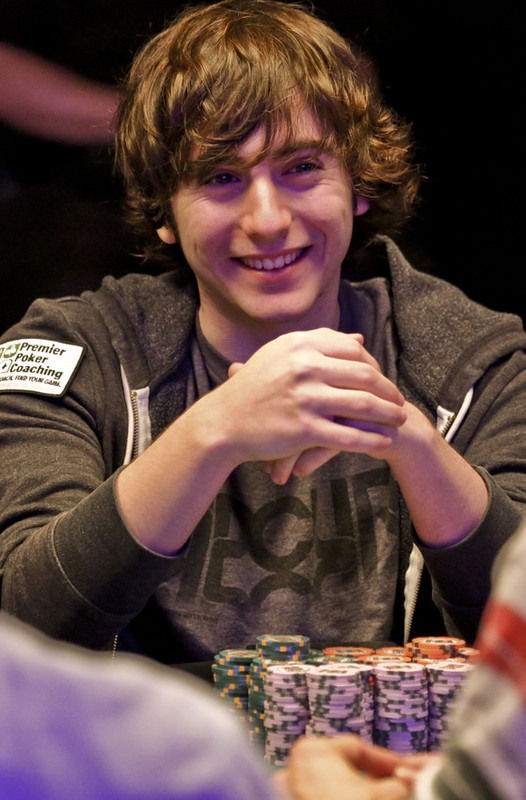






Daniel Strelitz: WPT Champ And Recent WSOP Bracelet Winner Looks To Avoid ‘Winner’s Tilt’Strelitz Earned First Career Bracelet In $5,000 No-Limit Hold’em Event At 2019 WSOP |
|
|

At the age of 29, Daniel Strelitz is having his best year ever on the tournament circuit. The Torrance, California-native got warmed up last November with a third-place showing in the Planet Hollywood WSOP Circuit main event, and in January, he picked up a massive $951,480 for finishing runner-up in the PokerStars Caribbean Adventure main event.
Strelitz wasn’t done, however. In the $5,000 buy-in no-limit hold’em event at the 2019 World Series of Poker, he finally broke through for his first career gold bracelet, and a score worth $442,385. The win was especially sweet for Strelitz, who had numerous close calls at the series, including a runner-up performance in the 2016 $5,000 turbo event, and a third-place showing in a 2014 $1,500 no-limit event.
“I finally got if off my back,” he said immediately following his win. “I came close a few times, and it’s kind of disappointing. But it wasn’t like I was desperate. It’s still just a massive relief. I’m super happy.”
Strelitz is now two-thirds of the way to poker’s Triple Crown, having previously won the World Poker Tour L.A. Poker Classic back in 2017 for $1,001,110. He now has nearly $4.5 million in live tournament earnings, along with another $1.5 million won online.
 Card Player caught up with Strelitz at the series to talk about his poker origin story, nearly quitting after Black Friday, bouncing back after downswings, playing style, and how to avoid ‘winner’s tilt.’
Card Player caught up with Strelitz at the series to talk about his poker origin story, nearly quitting after Black Friday, bouncing back after downswings, playing style, and how to avoid ‘winner’s tilt.’
Julio Rodriguez: Can you talk a bit about how you discovered poker and got your start in the game?
Daniel Strelitz: I was first introduced to poker through my poppa (grandpa). He taught me different variations of five-card draw games when I was still very young. I started playing more seriously and feeling competitive when I was playing $10 home games with my friend [three-time WSOP bracelet winner] Brian Yoon in high school. I didn’t win right away, but I quickly learned how to study and improve. In 2008 I started watching PokerXFactor videos, which helped me greatly and turned me into a winning player. I started playing online around that time also, starting with $15 deposits on PokerStars.
JR: Before poker, did you have any idea of what you wanted to do as a career? At what point did you start to think that poker could be your full-time job?
DS: Before poker, I was studying biology in school. I didn’t know what I wanted to do with that, I just knew that if I was going to go to college that I wanted to study biology or chemistry. I started to think I could make poker a job when I got second in the Sunday Million for $177,000 in 2009. I was playing once a week on Sundays and had a two-month span where each Sunday I had a massive (at the time to me at least) score. My family was cautious at first and worried about me dropping out of college, but once I started having success, they were 100 percent supportive. My girlfriend at the time, now wife, also supported me going for it because she saw what was happening with school and poker.
JR: Can you talk a bit about those early years as a poker pro? Who was part of your crew? What did you learn about yourself during downswings? What about after booking a nice win?
DS: My longest poker friend was Brian Yoon. We were friends since middle school and learned poker together. I also posted on the Pocket Fives forum a ton around that time and after my second place in the Sunday Million and WSOP bracelet winner] Michael Gagliano messaged me basically just to say what’s up and find out more about me. He invited me into his AIM (AOL Instant Messanger) group chat and I basically never left. Other people in that chat that I learned poker with were Brandon Shane, Dave D’Alesandro, Pratyush Buddiga, Pius Heinz, and eventually I befriended Niall Farrell as well.
 When I first started playing professionally, I was unequipped to deal with everything. I ended up going on a decent sized downswing for a while. During that time, I was backing Pius in online tournaments and he was doing well, so it kind of kept me afloat. Eventually I broke through the downswing. Basically ever since, when I book a big win, [I feel] relief more than anything. After a win all I want to do is get some food and hang out with my wife.
When I first started playing professionally, I was unequipped to deal with everything. I ended up going on a decent sized downswing for a while. During that time, I was backing Pius in online tournaments and he was doing well, so it kind of kept me afloat. Eventually I broke through the downswing. Basically ever since, when I book a big win, [I feel] relief more than anything. After a win all I want to do is get some food and hang out with my wife.
JR: How did you handle your deep run in the 2012 WSOP main event? Were you just happy to be there, or disappointed that you fell short of the final table? Did that score change your life at all?
DS: In 2012 I was actually considering going back to school because of Black Friday. I was taking classes in community college which was a big difference compared to the university I went to. It was almost too easy for me, and wasn’t challenging, like being in high school again. Then I got 24th in the main, and it reinvigorated poker for me. It will always be bittersweet to me, because it was such a big score. However, I was almost the chip leader with 27 left, so I had very realistic expectations of making the final table and making real life-changing money.
JR: Can you talk about the evolution of your game? Do you take a more math-based, GTO (game theory optimal) approach to tournament poker or do you play more of an exploitative style of poker?
DS: I used to play pure exploit, before GTO was even really a thing. Nowadays I feel I have a relatively good grasp on both and try to employ whichever strategy makes sense at the table. At softer tables I’ll play a bit more “creatively” and at tough tables I’ll stick to solid fundamental GTO poker.
JR: How much study do you put in nowadays compared to earlier in your career? When you study, are you just memorizing as many charts and numbers as you can, or are you pulling up real-world situations that you found yourself in? How often do you review hands between sessions, or talk with friends about tough spots?
 DS: I used to study more when I was younger for sure. I go through phases where I’ll put a decent amount of effort into studying and others where I won’t for a while. I personally use hands I’ve played and then will make up scenarios based on that hand or similar to it and study the sims for that hand. I am also constantly talking hands with my friends, especially when we travel to live tournaments together. Joining as a coach for Chip Leader Coaching has helped with studying though. Explaining your thought process is in itself an act of studying, and preparing lessons can be good for that.
DS: I used to study more when I was younger for sure. I go through phases where I’ll put a decent amount of effort into studying and others where I won’t for a while. I personally use hands I’ve played and then will make up scenarios based on that hand or similar to it and study the sims for that hand. I am also constantly talking hands with my friends, especially when we travel to live tournaments together. Joining as a coach for Chip Leader Coaching has helped with studying though. Explaining your thought process is in itself an act of studying, and preparing lessons can be good for that.
JR: Do you have any advice for poker players looking to get better and move up in stakes?
DS: My advice to get better at poker is to start from the beginning. Get your preflop ranges down… really down. Then start developing a flop strategy, then turn and river strategies. I also think learning players shouldn’t worry about bet sizing nearly as much. If 100 percent of bets you make are half-pot bets, but you are betting and checking when you’re supposed to, you’re going to be more successful than someone who worries more about sizing, not which hands and boards to bet or check.
JR: After a couple of close calls at the WSOP, you got the bracelet this year. How much does winning a bracelet mean to you? Or is it all about the money?
DS: Winning the bracelet means a ton to me. I think the money is slightly more important but holding the bracelet and taking pictures was a surreal experience. It’s been nine full summers at the WSOP with a decent amount of close calls and all my friends winning, so finally closing one out is just amazing to me.
JR: You started the year off with a huge score and then got a win here at the series. Do you believe in momentum, or hot streaks, when it comes to tournament results? When you are running well, do you try to play more often to take advantage or just chalk it up to variance?
DS: Momentum and hot streaks are a very complicated thing in poker. Having the confidence at the table that winning gives you will definitely help you win more pots. However, there’s also such thing as ‘winner’s tilt.’ You aren’t playing you’re A-game anymore because you’re still on cloud nine. That’s what happened to me after my LAPC win. I went on my biggest downswing yet. So it goes both ways.
 JR: What kinds of ambitions do you have for your poker career? Do you want to eventually become a regular crusher in the high rollers? Transition to cash and get off the road? Leave poker entirely?
JR: What kinds of ambitions do you have for your poker career? Do you want to eventually become a regular crusher in the high rollers? Transition to cash and get off the road? Leave poker entirely?
DS: I don’t really have ambitions other than making a good living playing poker. At one point I wanted to be a high roller grinder, but after having playing a few and thinking about it more, I’m just not interested at all in playing anything over $25,000 at the moment. I have no plans to leave poker but I don’t know if I could do it forever, so my long-term future is a mystery.
